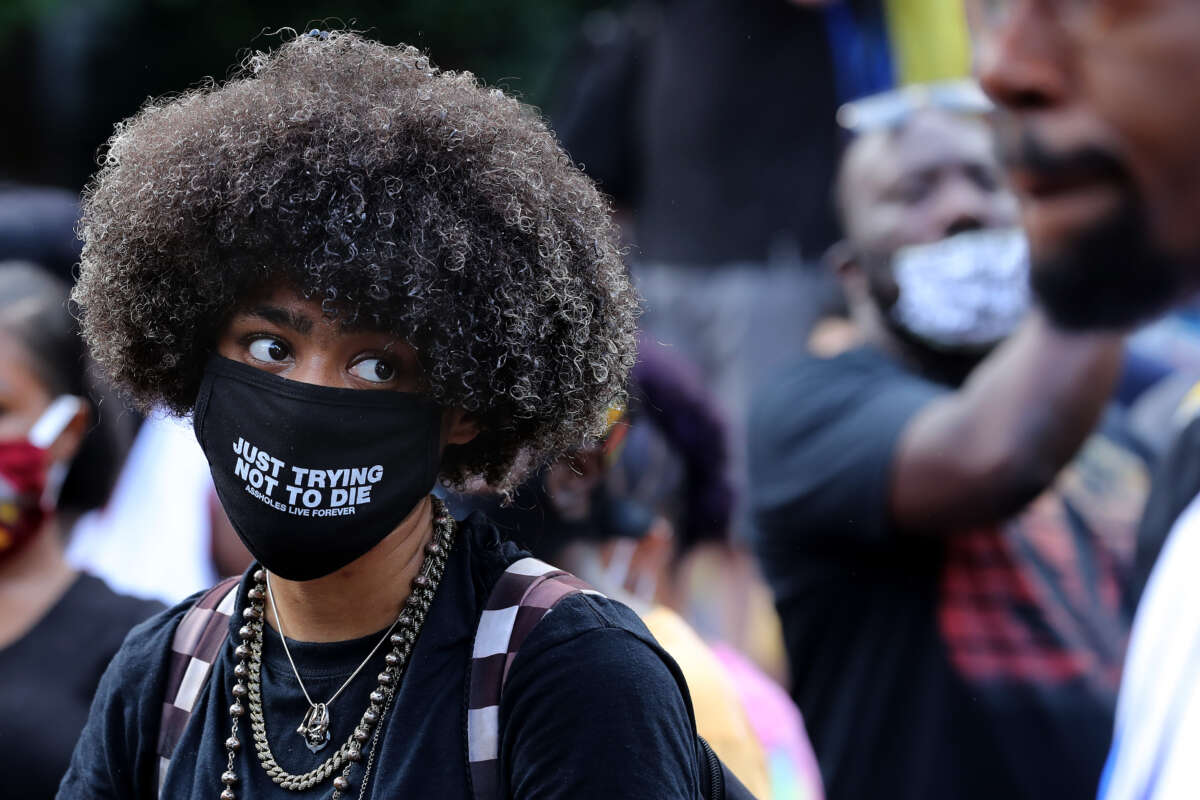Did you know that Truthout is a nonprofit and independently funded by readers like you? If you value what we do, please support our work with a donation.
On Monday, the Supreme Court declined to review a case with significant ramifications for protest rights in Texas, Mississippi and Louisiana. The Court’s denial of certiorari allows the anti-First Amendment decision by the Fifth Circuit Court of Appeals, known as one of the most conservative circuits in the nation, to go into effect.
“The courts refusal to take up the first amendment protest case and we are seeing bedrock civil rights being stripped away and judicial relief being made impossible to obtain,” Alejandra Caraballo, a clinical instructor at Harvard Law’s Cyberlaw Clinic, said on social media. “It’s a dark day for the judiciary which has become wholly illegitimate.”
The case, Doe v. McKesson, was filed by a police officer who was injured during a protest in Baton Rouge, Louisiana, sparked by the police killing of Alton Sterling in 2016. The protester who threw the hard object at the officer was never identified. Instead, the officer filed a lawsuit targeting DeRay McKesson, a prominent Black Lives Matter activist, the hashtag #BlackLivesMatter, and the Black Lives Matter movement in its entirety. The lawsuit alleged that McKesson and the other defendants should be held civilly liable for inciting “violence and property loss.”
“[I]n a legal complaint that is riddled with typos, Doe’s lawyers claim that McKesson should be liable for ‘injuries and compensable damages . . . greater than $75,000.00’ because of the alleged actions of an unknown person who, in case this fact is not yet clear, is not DeRay McKesson,” Ian Millhiser wrote in ThinkProgress in 2019.
Brian Jackson, the chief judge of Louisiana Middle District Court, said in his 2017 opinion on McKesson’s motion to dismiss that the officer failed to “state a plausible claim for relief against an individual or entity that both has the capacity to be sued and falls within the precisely tailored category of persons that may be held liable for his injuries, which he allegedly suffered during activity that was otherwise constitutionally protected.”
Jackson pointed out that not only are social movements immune to lawsuits, but that the officer failed to demonstrate that McKesson overstepped the boundaries of First Amendment-protected speech, which is understood to safeguard political protests.
However, in 2023, the Fifth Circuit Court of Appeals overturned the lower court’s decision, allowing the officer’s negligence claim against McKesson to proceed. The Fifth Circuit ruled that the plaintiff had “plausibly alleged that McKesson…knew or should have known that the police would be forced to respond to the demonstration, that the protest would turn violent, and that someone might be injured as a result.”
“[T]he Doe opinion offers a road map to police officers — or, really, to anyone injured by a single participant in a political movement they disagree with — to shut down those movements with litigation,” Millhiser explained in ThinkProgress.
McKesson’s defense that the First Amendment “forbids a State from imposing liability in these circumstances,” was rejected, greatly limiting First Amendment protection and imperiling the right to protest in Texas, Mississippi and Louisiana.
“Such an exotic theory would have enfeebled America’s street-blocking civil rights movement, imposing ruinous financial liability against citizens for exercising core First Amendment freedoms,” Judge Don Willett wrote in his dissent. “Holding McKesson responsible for the violent acts of others because he ‘negligently’ led a protest that carried the risk of potential violence is impossible to square with Supreme Court precedent holding that only tortious activity meant to incite imminent violence, and likely to do so, forfeits constitutional protection against liability for violent acts committed by others.”
The decision by the U.S. Supreme Court to not grant certiorari in this case sends it back to the lower courts to proceed on the merits. While McKesson may be found not liable by a jury, advocates believe that the Court’s refusal to take the case may “have a chilling effect on people hoping to organize and demand racial justice.”
“The goal of lawsuits like these is to prevent people from showing up at a protest out of the fear that they might be held responsible if anything happens,” McKesson said in a statement. “But people don’t need to be afraid to show up. The Constitution still protects our right to protest.”
Trump is silencing political dissent. We appeal for your support.
Progressive nonprofits are the latest target caught in Trump’s crosshairs. With the aim of eliminating political opposition, Trump and his sycophants are working to curb government funding, constrain private foundations, and even cut tax-exempt status from organizations he dislikes.
We’re concerned, because Truthout is not immune to such bad-faith attacks.
We can only resist Trump’s attacks by cultivating a strong base of support. The right-wing mediasphere is funded comfortably by billionaire owners and venture capitalist philanthropists. At Truthout, we have you.
Truthout has launched a fundraiser, and we have only 24 hours left to raise $15,000. Please take a meaningful action in the fight against authoritarianism: make a one-time or monthly donation to Truthout. If you have the means, please dig deep.
